Key takeaways:
- Workshop dynamics are influenced by participant personalities, with trust and open communication fostering creativity.
- Poetry workshops provide essential peer feedback and nurture a sense of belonging, enhancing both writing skills and emotional resilience.
- Challenges include varying skill levels among participants and the balance between constructive criticism and encouragement.
- Participant insights reveal the value of sharing vulnerabilities, receiving positive feedback, and engaging in follow-up activities for continuous growth.
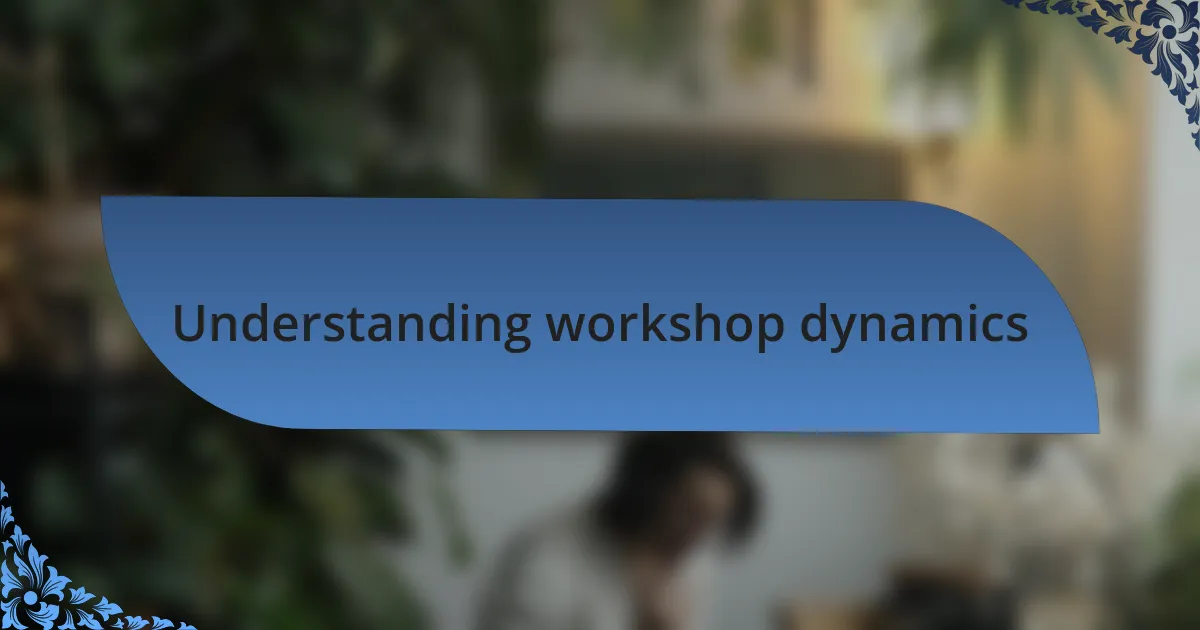
Understanding workshop dynamics
Workshop dynamics are fascinating and complex, often shaped by the personalities and experiences of the participants. I remember a particular workshop where a quiet poet surprised everyone by sharing a deeply personal piece. Her vulnerability not only inspired others to open up but also transformed the atmosphere completely. Isn’t it interesting how a single voice can shift the energy in a room?
Interactions in workshops often mirror the dynamics of any group setting, where trust and respect are paramount. I’ve noticed that setting clear guidelines for feedback can create a safe space for poets to express themselves more freely. It’s like building a bridge—once it’s sturdy, everyone’s more willing to cross it and share their work. Don’t you think open communication nurtures creativity?
Furthermore, the role of the facilitator cannot be overlooked. Their ability to guide discussions, balance differing opinions, and encourage quieter participants is vital. I’ve been in workshops where a skilled facilitator recognized a moment of tension and turned it into a learning opportunity, prompting reflections that none of us had anticipated. Have you ever experienced a conversation that changed your perspective on writing?
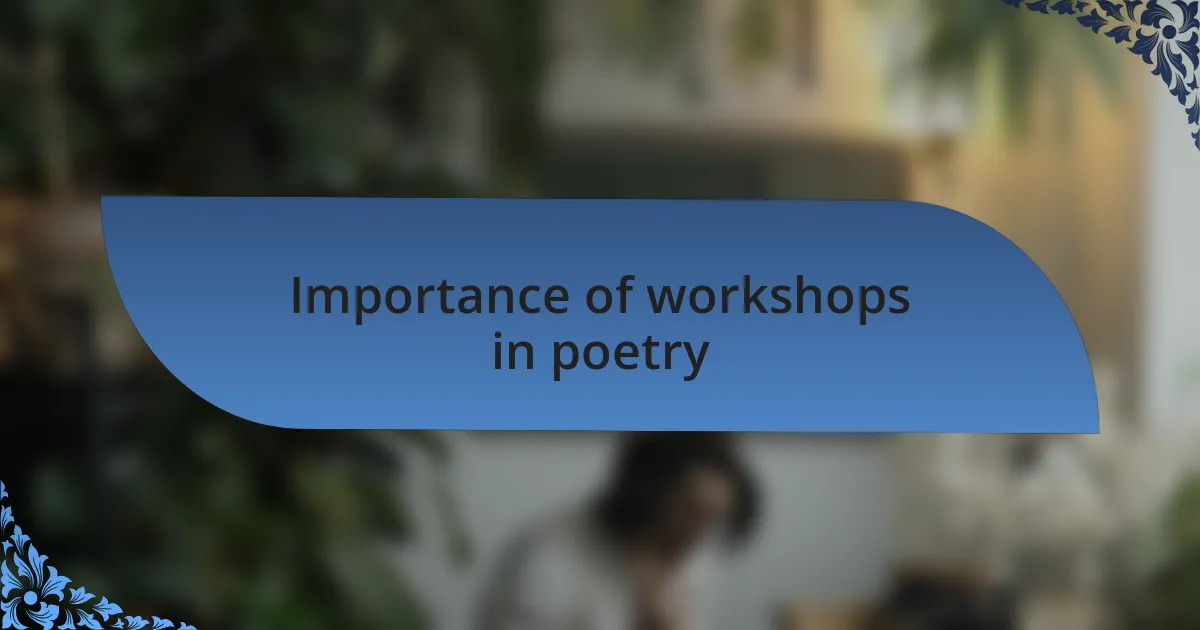
Importance of workshops in poetry
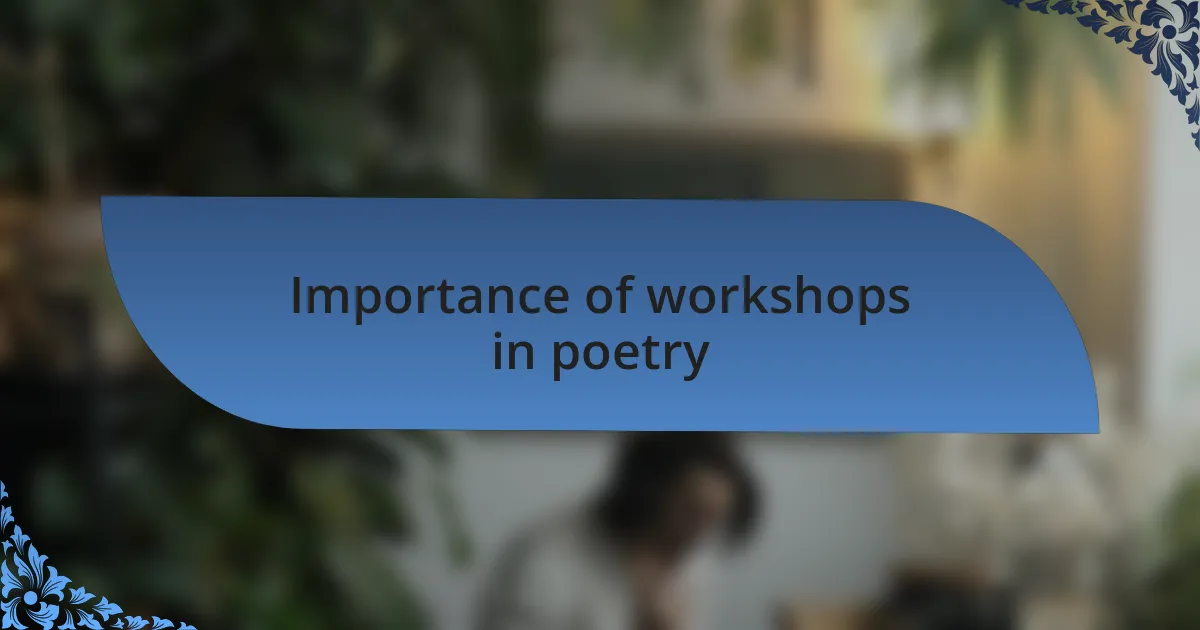
Importance of workshops in poetry
In my experience, poetry workshops serve as essential incubators for creativity. I recall a session where we examined a classic poem, dissecting its layers line by line. This collective analysis prompted me to look at my own work differently, unveiling nuances I hadn’t noticed before. Have you ever found that a simple discussion can reshape your understanding of your own art?
The peer feedback process in workshops is invaluable. I vividly remember a time when a fellow poet highlighted the rhythm in my piece that I had completely overlooked. Their observation opened my eyes to the musicality in my writing, and I left the workshop with a renewed perspective. Isn’t it fascinating how others can shine a light on aspects of our work that we might miss?
Moreover, the supportive atmosphere created in workshops fosters a sense of belonging. I once felt isolated in my poetic journey until I attended a workshop where I connected with like-minded souls. Sharing our struggles and triumphs nurtured not just our writing skills, but also our emotional resilience as artists. How powerful is it to know you’re not alone in your creative battles?
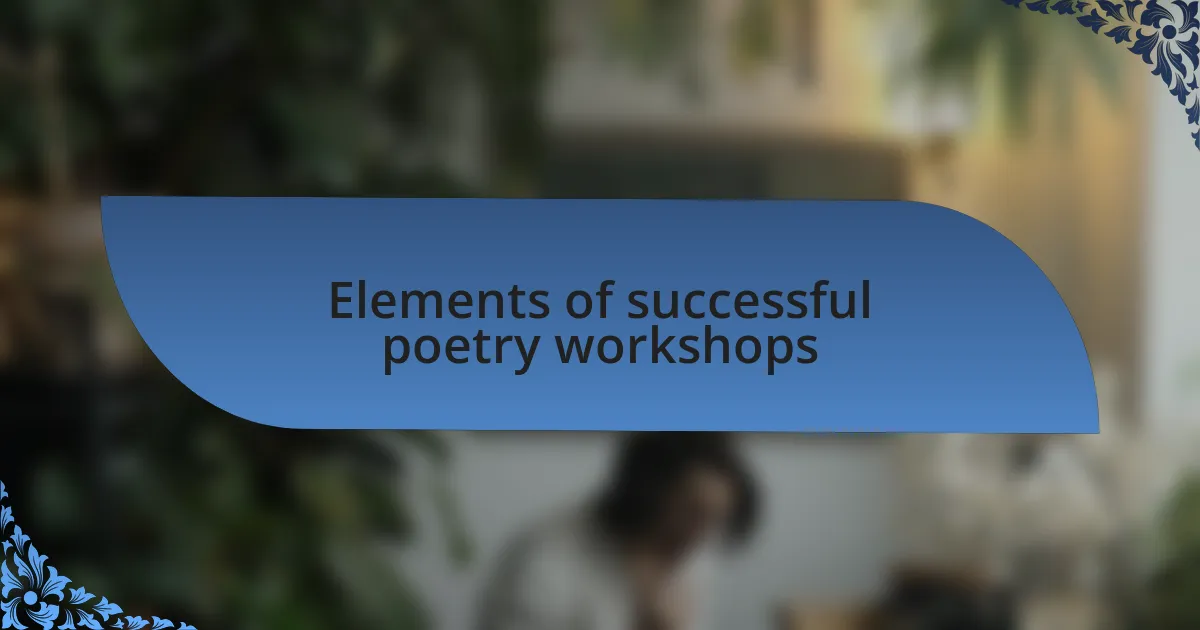
Elements of successful poetry workshops
One of the key elements of successful poetry workshops is a clear structure that allows for both creativity and critique. I remember a workshop where we followed a specific format: writing prompts, sharing work, and then feedback. This rhythm helped me focus, ensuring that I had enough time to dive into my writing while also feeling secure enough to share it with the group. Have you ever felt like a structured approach could help unravel your creative blocks?
Another vital aspect is the diversity of voices in the room. I once participated in a workshop where poets from various backgrounds shared their experiences and styles. This melting pot of perspectives enriched my understanding of poetry and inspired me to experiment with forms I’d never considered before. Isn’t it interesting how a different viewpoint can spark new ideas and elevate your own voice?
Lastly, active participation is crucial for fostering engagement and growth. I recall a time when we broke into small groups to discuss each other’s work, allowing for more intimate and detailed conversations. Each poet brought unique insights that not only improved my piece but also deepened my appreciation for the craft. Doesn’t that sense of collaboration enhance the creative experience?
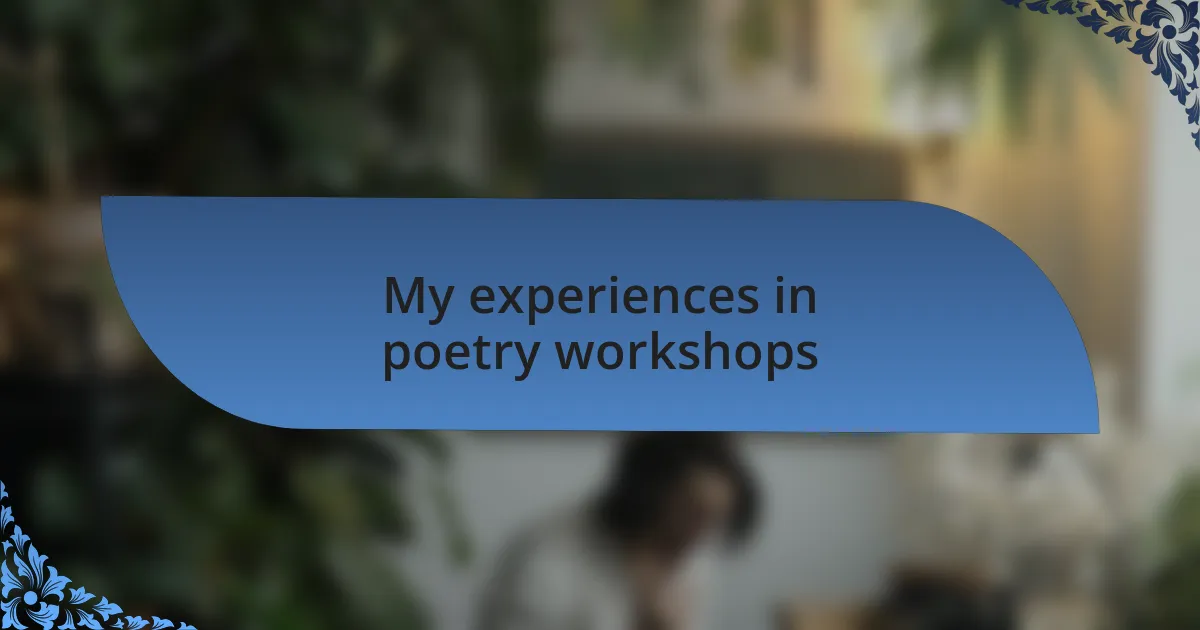
My experiences in poetry workshops
Participating in poetry workshops has been transformative for me. I vividly remember my first workshop, where I nervously shared a poem filled with raw emotion. The supportive feedback I received made me realize how important vulnerability is in poetry. Have you ever felt your words resonate deeply with someone else?
Another memorable experience happened during a session focused on rewriting. I was blown away by how a simple change in line breaks or word choice could completely alter the tone of a piece. This revelation pushed me to explore my own work more critically. Isn’t it fascinating how minor adjustments can magnify your message?
In one memorable session, we had a guest poet who led us through writing exercises that challenged conventional forms. I found myself experimenting with haikus and free verse, breaking free from my comfort zone. That day, creativity felt limitless, igniting a passionate fire within me. Does that thrill of breaking boundaries resonate with your creative journey?
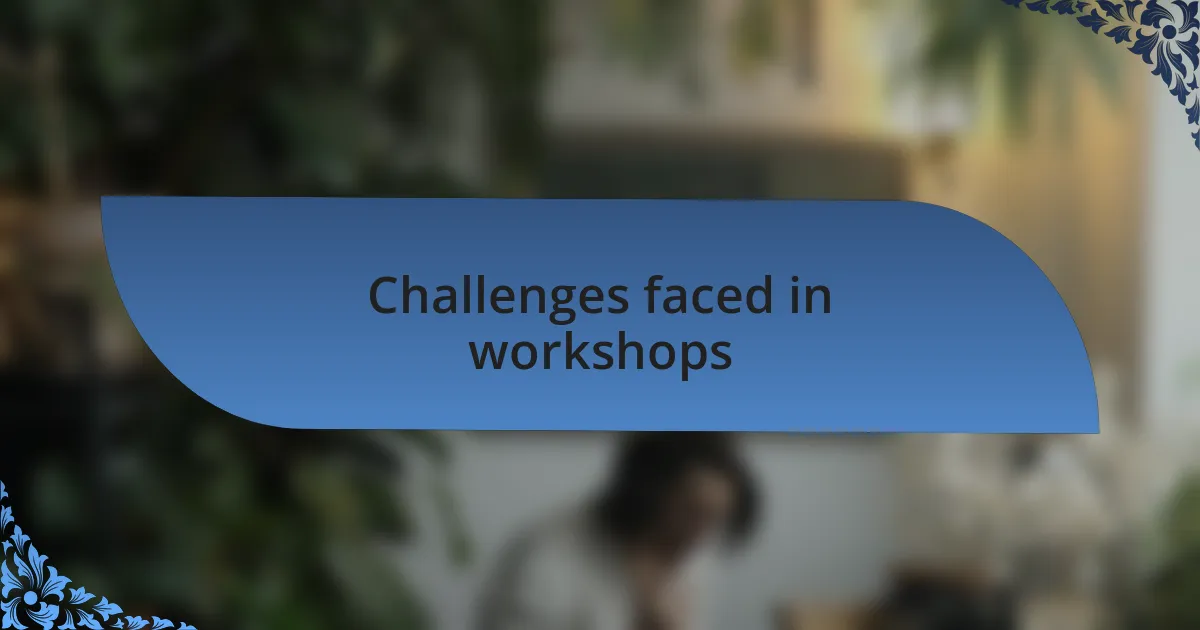
Challenges faced in workshops
As I’ve navigated various poetry workshops, one persistent challenge I’ve encountered is the diverse range of skill levels among participants. It can be a bit disheartening to share my work in a room where some poets are so fluent in their craft that it feels intimidating. How can we all grow together when the gap seems so wide?
Another hurdle I’ve faced is the balance between constructive criticism and encouragement. I recall a time when a fellow poet received harsh feedback, which left the room feeling uneasy. It made me wonder, how do we foster a safe environment for creativity while also pushing each other to improve? Navigating that fine line is essential for a positive workshop dynamic.
Additionally, time constraints often limit the depth of discussion on each poem. I remember a workshop where we barely scratched the surface of my piece due to time running out. I left with lingering questions about my work. It leaves me pondering—how can we ensure everyone’s voice is heard without sacrificing the quality of critique? These challenges are part of our poetic journey, shaping how we interact and grow as artists.

Techniques to enhance workshop participation
One effective technique to enhance workshop participation is to implement icebreaker activities at the start. I once attended a workshop where we shared a poem that resonated with us personally. This not only warmed up the group but also created an immediate sense of connection. I found that such activities help participants to feel more comfortable sharing their work, bridging gaps and fostering camaraderie.
Another approach I’ve seen yield positive results is the use of peer-led discussions after reading sessions. I recall a workshop where we paired up to provide feedback to each other before presenting to the whole group. It was less daunting, and I felt more confident sharing my work once I had tested it in a smaller, supportive setting. How often do we underestimate the power of small groups in cultivating our voices?
Finally, incorporating varied formats—like themed prompts or collaborative writing exercises—can significantly boost engagement. I remember a workshop where we collectively crafted a poem, each taking turns to add lines. This not only sparked creativity but also fostered a sense of ownership and collective responsibility. Don’t you think that blending different styles can help maintain energy and enthusiasm throughout the workshop?
Insights from participants’ feedback
Feedback from participants often reveals that sharing their own experiences can create a profound impact. I remember a workshop participant once shared how vulnerable they felt when presenting their work. This honesty not only inspired trust among the group but also encouraged others to open up about their own fears. Isn’t it fascinating how a simple act of sharing can transform the atmosphere, making it a safe space for creativity?
Another key insight that emerged from feedback was the appreciation for constructive criticism. In my experience, when participants learned to frame their critiques positively, it fostered a more supportive environment. I recall a moment when someone gently pointed out areas for improvement while celebrating strengths. This balanced approach helped everyone feel valued while also motivating us to enhance our craft. Why do we often hesitate to provide feedback, even when it can fuel growth?
Lastly, many participants noted that follow-up activities after the main sessions were invaluable. In one workshop, we were encouraged to reflect on what we’d learned and set personal goals. This reflection allowed me to internalize the feedback and carry it forward. Have you ever considered how essential it is to plan for growth beyond the workshop itself? Such insights underscore the importance of continuous engagement and learning, extending the workshop experience well into our writing journeys.